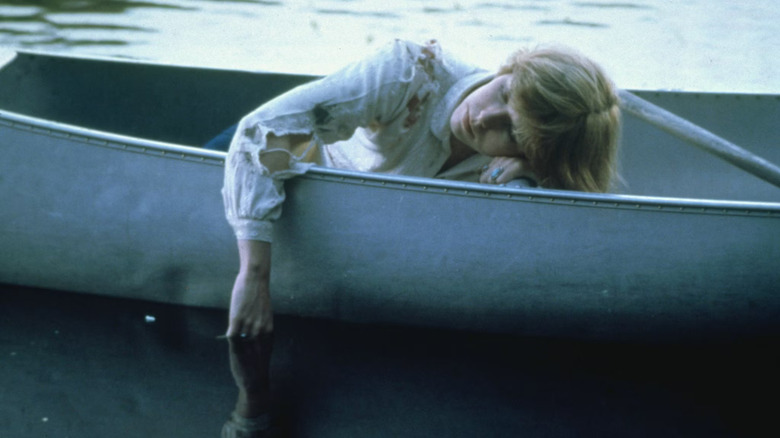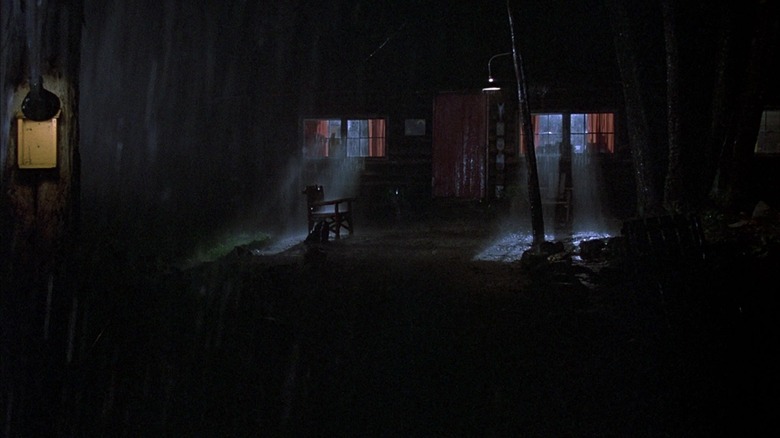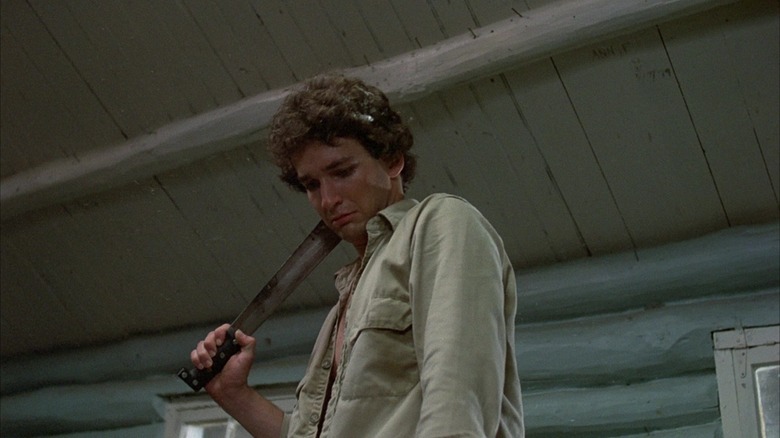Friday The 13th's Writer Tried To Sell His Blood In Order To Help Finance The Horror Film
Producer/directed Sean Cunningham has admitted multiple times that, when making his seminal slasher movie "Friday the 13th," he was directly hoping to ape the success of John Carpenter's "Halloween." The latter, released in 1978, made $70 million on a tiny budget of about $350,000. Cunningham decided to up the budget of "Friday" to a whopping $550,000, and he, miraculously, achieved his goal; "Friday the 13th" made almost $60 million.
The story of "Friday the 13th," as any bloodthirsty Gen-Xer can tell you, follows a group of camp counselors who have arrived at Camp Crystal Lake in New Jersey to prepare it for the summer's coming campers. They entertain themselves by smoking weed, engaging in coitus, and telling ghost stories of the poor child — Jason Voorhees — who drowned in Crystal Lake a few years before, unsupervised when his counselors were distracted by their vices. Shortly thereafter, a mysterious, unseen killer begins stalking the counselors at night, murdering them one by one. Is Jason back from the grave to wreak vengeance?
The original script for "Friday the 13th" was called "A Long Night at Camp Blood," but Cunningham ordered screenwriter Victor Miller to rework it as "Friday the 13th." After "Friday the 13th," Miller would go on to be nominated for eight Emmys for writing soap operas like "All My Children," "General Hospital," "One Life to Live," and "Another World." He won three Emmys for "All My Children." But in back 1980, when "Friday the 13th" was still in production, the cheap movie desperately needed money.
In a 2015 oral history about "Friday," conducted by Uproxx, Miller re-told the story about how, as a last-ditch effort to raise money, tried to sell his blood to an oblique scientific study. Rather disappointingly, he didn't actually get paid.
I'll give ya $25 for yer blood
Miller has likely repeated this story many times at horror conventions, but it was amusing enough to repeat:
"The week before 'Friday the 13th' opened — and I've told this story many times — I was literally trying to sell my blood to this company in Bridgeport, Connecticut and they were doing a study of antibodies. I went and they drew a little blood to see if I had enough antibodies for the study and if I did then they would take a pint and would have paid me 25 dollars. They called me back the next day saying, 'You don't have enough antibodies, sorry you don't qualify for this study.' I didn't get the 25 dollars."
At least the study didn't extract a pint of Miller's blood and then leave him his and dry, so to speak. They only took a little. But it surely is an indicator of how financially desperate Miller was if he was in a position to give blood merely for a $25 cash infusion. $25 in 1980, by the way, would be worth almost $100 today, which is still not a lot. It's unclear, however, if Miller was willing to give a pint of blood to fund the release of "Friday the 13th," or if he just needed a little extra cash on hand for bills or personal reasons.
Either way, "Friday the 13th" was maying so little, many of the people involved were doing it for a quick buck. Actor Kevin Bacon was quoted in the same oral history and noted that he had no money for rent. He was glad to have made the slasher as it covered him financially, and he now learned what it was like to act in a slasher movie.
Who owns Friday the 13th?
For many years, the actual rights to "Friday the 13th" have been a little in flux, and indeed, even the title isn't allowed by certain filmmakers; this is why two of the Jason Voorhees sequels — "Jason Goes to Hell: The Final Friday" and "Jason X" — don't have the phrase "Friday the 13th" in their titles. It seems that Sean Cunningham and Victor Miller have been going to court over whose idea the series actually was, and who should own the rights to the film series. It was back in 2018 that Miller was granted copyright termination in order to retain the rights himself. For the next three years, Sean Cunningham appealed the ruling, arguing that Miller was little more than a hired gun.
Miller, however, was no contract employee and was rewarded the rights to the first film in 2021.
The rights issues have put the "Friday the 13th" film series on weirdly shaky ground. It was Miller who invented the character named "Jason Voorhees," even though the twist in the first "Friday" is that Jason's mother, Pamela, was actually the killer. Cunningham, however, was the one who resurrected Jason, put him in a hockey mask, and turned him into the pop icon we all know and love today. Cunningham owns the rights to that particular version of the character ... but not to his name. If Miller wanted to write another "Friday" movie, he could name the killer Jason Voorhees, but he couldn't use the hockey mask. If Cunningham wanted to make one, he couldn't say "Jason," nor make references to Crystal Lake. It's all very complicated.
After 12 "Friday" movies, though, we may be good. Not everything needs to remain a permanent part of the pop consciousness.


